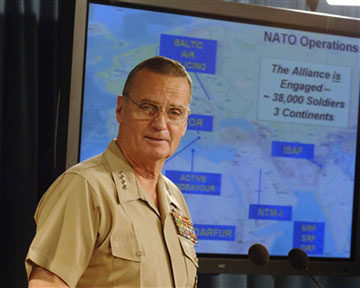 Taliban strength reduced by at least one-fourth, says General Jones September 21, 2006
Meeting with journalists at the Pentagon September 20, Marine General James Jones was asked for an overall estimate of the number of Taliban fighters killed in Operation Medusa, wherein 6,000 NATO troops from five countries, along with Afghan army forces, established a presence for the first time in Khandahar province.
Jones said the number of those killed was around 1,000, "but if you said 1,500 it wouldn't surprise me." The alliance estimates Taliban fighting strength at 3,000 to 4,000 militants, Jones said, plus Afghans that the Taliban pays or coerces to assist it in specific military operations. Using the higher number for Taliban strength and the lowest number for their losses in fighting NATO, it can be presumed that the Taliban lost at least one-quarter of its fighters in the past few weeks. Using other figures would make the percentage lost even higher, Jones said. "[W]hat we don't have clear figures on, " he added, "is [the Taliban's] ability to regenerate themselves and that is a serious problem." The general also said that the Taliban is "not the only problem" confronting forces in Afghanistan. Al-Qaida remnants, opium traffickers and other criminal gangs, corruption and tribal conflicts also contribute to the complex security challenges faced by the alliance as it helps to stabilize Afghanistan, the general said. Afghanistan remains a leading producer of illegal drugs, which Jones said were "at the core of everything that can go wrong in Afghanistan." The drug trade affects governmental corruption, crime, the creation of a market economy, and also the insurgency, he said. "[T]here's increasing evidence that a lot of the funding goes from the narcotics traffickers to the criminal elements, to what's left of al-Qaida, to the Taliban and anyone else that wants to create mischief," said Jones. He called it "a pervasive and growing problem which has only gotten worse." Jones said that in the matter of eliminating the opium/heroin industry from Afghanistan, "we're not making progress. We're losing ground. And that has to be reversed." What is needed, said Jones, is more focus, more organization, more planning and the establishment of a set of priorities to help the government reach out to all its citizens. "Trying to do everything all at once and doing nothing really well is not a strategy," Jones said. "It is simply just a way to spend money and to hope that you're doing the right thing." NATO FOREIGN MINISTERS TO MEET SEPTEMBER 21 The foreign ministers of NATO's 26 member countries are scheduled to meet September 21 on the sidelines of the U.N. General Assembly meeting, and senior U.S. officials said that Afghanistan would figure prominently in their discussions. The officials, speaking on background September 20 in New York, said that the successful conclusion of Operation Medusa sent a clear message to the people of Afghanistan that the Taliban's reign of terror will not return. Taliban remnants, they said, re-infiltrated southern Afghanistan this summer and attempted to convince Afghans that the country's "experiment with democracy" was a mistake. They also tried to buy support by hiring local fighters and spreading money around in an area of the country that faces profound economic hardship. But the militants fatally miscalculated the alliance's resolve in moving south -- into the Taliban's former stronghold -- to take over security responsibility from U.S.-led coalition forces. In the recently completed Operation Medusa, the alliance "wiped the floor with the Taliban," one official remarked. NATO is continuing the momentum by conducting follow-up operations, as well as engaging local authorities and supporting efforts to deliver humanitarian aid, facilitate rebuilding and "bring help and hope" to the people. Afghans are scared and want to see who is stronger, the officials said, but NATO and Afghanistan's armed forces must convince them that the Taliban, "yesterday's men," will not win, the officials said. To fulfill both missions, the officials said, NATO's International Security Assistance Force needs more troops. They reported that Poland and Romania intend to send soldiers and that Canada and the United Kingdom are planning to augment their forces already on the ground. Publish A Letter on SitNews Read Letters/Opinions
|
||
